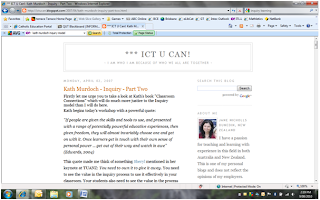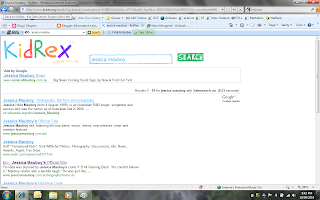Questionnaire #1
What do I know about my topic?
Having participated in the Information Literacy Planning Overview (ILPO) from 1997 has given me a generalised knowledge of Inquiry Learning. The ILPO follows a model of Defining a topic, Locating, Organising and Synthesising Information, Presenting the information and Evaluating the process. The students I will be teaching have not encountered this process. The last time I engaged in this process was in 2006 with the then Year 7 students in small groups.
How interested am I in this topic?
I am very interested to know if this model holds up to contemporary scrutiny and literature. Is there anything better? Does it fit with the definition of Inquiry Learning?
How much do I know about this topic?
The only other inquiry models that I am familiar with are the KLA inquiry models in the syllabus documents.
When I do research, what do I generally find easy to do?
If I have the readings available (already in a reading list), I find it easy to analyse and synthesise the information contained within them.
When I do research, what do I generally find difficult to do?
If I do not have the readings available, I find it easy to locate the information I need. However, I then find it difficult to organise and synthesise this information. I experience information overload and overwhelming feelings of inadequacy.
The aquisition of new search skills using the internet has proved fruitful. 'Wonder Wheel' is a google tool which is not new. It is only since the beginning of this course, however, that I have used it. I have followed a path on Wonder Wheel, using 'Inquiry Learning' as the search words on google. The first wonder wheel image looked like this.
Having been taught by Kath Murdoch and Jenni Wilson in Melbourne during the early '90's, I thought I'd explore the 'Kath Murdoch' path. Which lead me to the following page.
I explored further, to come across this page:
Which lead me off the 'wonder wheel' path and onto a blog:
The web address is:
I would like to explore this further.
I had been tossing up the idea of taking my little 'inquiry group' through the wonder wheel process. I decided to search google for 'Cathy Freeman', which is the topic one of the girls has decided to study. Here is what I came up with:
Perfect!
The focus questions the girls decided upon included biographical details as well as childhood details of their chosen person.
Google Scholar
It is now time to reflect upon my experiences using Google scholar. Setting the preferences to access the QUT database, I searched for 'Information Literacy AND indigenous education'.
Which brought me to the following page.
Not surprisingly, the majority of articles focused on LITERACY and INDIGENOUS EDUCATION.
I was interested to see an article from the Reading To Learn website. I explored this further.
And came to this article:
Ok, I admit that I have a soft spot for this program, so although it is not about information literacy, it is here for my own personal interest.
Chapter 8 shown here is contained in the book
Pedagogy and the Shaping of Consciousness: Linguistic and Social Processes By Frances Christie.
Must get my hands on that.
Now I added the boolean search information + literacy AND indigenous education
No difference. Let's try in quotation marks.
'information literacy' AND indigenous education.
Nope. Exhausted that path. I'm interested in Bernadette's search for learning outcomes and inquiry learning. Tomorrow I will search that.
When tomorrow comes....I will change my mind. Thinking about Donna's and Maria's blogs reminded me to look again at the 'Successful Searching' wiki produced by BCE.
When tomorrow comes....I will change my mind. Thinking about Donna's and Maria's blogs reminded me to look again at the 'Successful Searching' wiki produced by BCE.
 After asking to join the wiki, I had a go at searching using Boolify.
After asking to join the wiki, I had a go at searching using Boolify.One site lead me to academia.edu. Interesting but too difficult to access the articles contained within.
Further playing lead me to 'kid rex' safe searching for kids. I tried out a search conducted with google wonder wheel with the little research group today, hoping that the sites chosen today would be considered 'kid friendly'. I was in luck.
The little group of researches have called themselves the ATM's - Awesome Search Gals. ATM represent the first letters in their names. The two other girls found information in non fiction books in the school library to help them. We searched the library catatlogue together, first thinking about whether we would expect to find information on our topic in the library. The girls who were studying contemporary entertainers thought they would not find information in the library, but could not articulate why. After some discussion, we came to the conclusion that school libraries would not generally house information on contemporary teenage entertainers, as the information is likely to have a short life and not be something that children would be researching.
I don't know how this happened, but I've created a GLOG.
Crumbs...it's huge. I've created a monster. Oh well, time for bed.
Questionnaire #2
What do I know about my topic?
There are many models of inquiry, which all follow similar stages. The key is to find the model which suits your subject area and mode of teaching.
How interested am I in this topic?
Since beginning the search for literature and the inquiry unit with the children I have re-kindled a love for inquiry learning.
How much do I know about this topic?
I now have many documents and readings on inquiry learning but, as predicted, I am experiencing information overload. After searches, I quickly save the documents, skim and scan and then I'm off to do another search.
When I do research, what do I generally find easy to do?
I find it easy to locate information and to skim and scan to find key words.
When I do research, what do I generally find difficult to do?
I am still finding it difficult to attend to the details of the readings and to organise and synthesise my information.











